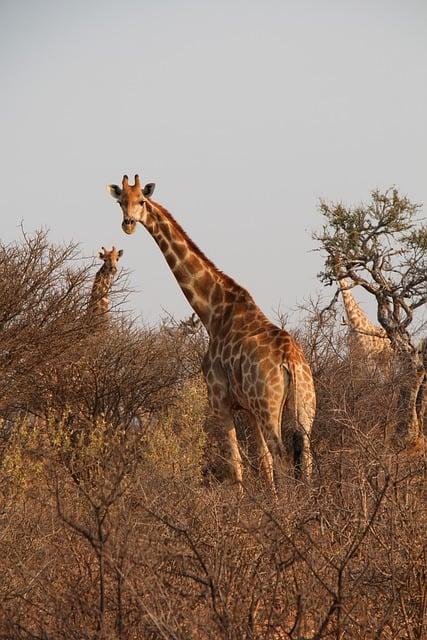In the vast tapestry of Africa’s diverse landscapes, from the sun-drenched savannas to the lush rainforests, a complex narrative unfolds—a narrative that intertwines the continent’s natural splendor with its economic pursuits. Tourism, often hailed as a beacon of hope for sustainable development, plays a pivotal role in this story. Yet, beneath the surface of postcard-perfect images lies a nuanced tale of economic dependency, where the promise of prosperity is delicately balanced with the challenges of reliance. As travelers flock to witness the majestic wildlife and vibrant cultures, Africa stands at a crossroads, navigating the intricate dynamics of tourism’s influence on its economic sovereignty. This article delves into the multifaceted role tourism plays in shaping Africa’s economic landscape, exploring both its potential as a catalyst for growth and the complexities of its dependency.
Tourisms Double-Edged Sword in African Economies
Tourism in Africa acts as both a boon and a bane for local economies. While it brings in foreign currency and creates job opportunities, it also risks creating a fragile economic dependency that can be easily disrupted by global events. The inflow of tourists contributes significantly to GDP growth, yet this reliance on tourism can lead to economic vulnerabilities. Seasonal fluctuations and external factors such as political instability or global pandemics can severely impact the industry, leaving communities that depend on tourism economically stranded.
- Economic Growth: Tourism boosts infrastructure development and generates revenue.
- Job Creation: Provides employment in sectors like hospitality, transport, and retail.
- Cultural Exchange: Promotes cultural understanding and appreciation.
Conversely, an over-dependence on tourism can lead to resource depletion and cultural commodification, where traditional practices are altered for tourist consumption. The challenge for African nations is to harness the benefits of tourism while developing other sectors to ensure a balanced and resilient economy. Sustainable tourism practices and diversified economic strategies are crucial in mitigating these risks.

Cultural Riches and Economic Vulnerabilities
Africa’s diverse cultural heritage, from its ancient historical sites to vibrant traditional festivals, serves as a magnet for tourists worldwide. This cultural allure, while a significant asset, also reveals the continent’s economic fragility. Tourism, though a vital economic pillar, creates a dependency that can be precarious. This reliance often leaves many African nations vulnerable to external shocks, such as global economic downturns or pandemics, which can drastically reduce tourist inflows. The challenge lies in balancing the promotion of cultural riches while mitigating economic vulnerabilities.
- Over-dependence on tourism: Many African economies heavily rely on tourism as a primary source of foreign exchange, employment, and economic growth.
- Volatility of tourism revenues: External factors, such as political instability or health crises, can lead to sudden declines in tourist numbers, affecting national income.
- Need for diversification: To reduce economic vulnerability, there is a pressing need to diversify economies and develop other sectors, such as agriculture and technology.
Empowering local communities and investing in infrastructure can help stabilize the tourism sector, ensuring that cultural heritage becomes a sustainable source of prosperity rather than a fragile economic lifeline.

Strategies for Sustainable Tourism Growth
In the quest for economic resilience, African nations are increasingly turning to tourism as a vital engine for growth. To ensure that this growth is sustainable, several strategies can be employed. One approach is to prioritize community involvement in tourism planning and operations, empowering local populations to benefit directly from tourism activities. This not only enhances the authenticity of the visitor experience but also fosters a sense of ownership and pride among residents. Additionally, investing in eco-friendly infrastructure can significantly reduce the environmental footprint of tourism, ensuring that natural resources are preserved for future generations. Green building practices, renewable energy sources, and waste reduction initiatives are all critical components of this strategy.
Another effective strategy is to diversify the tourism offerings beyond traditional attractions, promoting cultural, historical, and adventure tourism to appeal to a wider audience. By doing so, countries can reduce the risks associated with dependency on a single tourism sector. It’s also essential to implement policies that promote fair trade and ethical practices, ensuring that tourism growth does not come at the expense of social equity or environmental integrity. fostering partnerships between governments, private sectors, and international organizations can provide the necessary support and resources to achieve long-term sustainability in tourism development. By integrating these strategies, African nations can harness the full potential of tourism to drive economic progress while safeguarding their unique cultural and natural heritage.

Empowering Local Economies through Tourism Innovation
In the vast and diverse landscapes of Africa, tourism serves as a powerful catalyst for economic growth, offering a plethora of opportunities to local communities. By fostering innovation within the tourism sector, African nations can reduce their economic dependency on traditional industries and tap into a sustainable model of development. Innovative tourism not only enhances the visitor experience but also promotes the rich cultural heritage and natural wonders that the continent is renowned for. Through creative approaches such as community-based tourism, tech-driven travel solutions, and sustainable practices, local economies can thrive, creating jobs and generating income that directly benefits the communities involved.
- Community-based tourism allows travelers to engage with and contribute to local cultures, ensuring that the financial benefits are distributed among community members.
- Technology-driven innovations in tourism, such as virtual reality tours and digital marketplaces, can make African destinations more accessible and appealing to a global audience.
- Sustainable tourism practices not only protect the environment but also attract eco-conscious travelers, further boosting local economies.
By embracing these innovative strategies, Africa can leverage tourism as a key driver for reducing economic dependency, enhancing resilience, and fostering inclusive growth. The potential for transformation is immense, as tourism continues to open doors to new markets and opportunities across the continent.
In Summary
As we journey to the end of our exploration into the intricate tapestry of tourism’s role in Africa’s economic dependency, it becomes evident that this vibrant continent stands at a crossroads. The bustling markets, serene landscapes, and rich cultural tapestries beckon travelers from every corner of the globe, promising a world of discovery and adventure. Yet, beneath this allure lies a complex web of economic dynamics that both empower and challenge the nations within.
Tourism, with its undeniable potential to foster economic growth, presents a dual-edged sword. It has the power to elevate communities, create jobs, and inspire cultural exchange, yet it also poses the risk of fostering dependency, leaving economies vulnerable to the ebbs and flows of global travel trends. The path forward calls for a delicate balance, where sustainable practices, diversified economies, and resilient infrastructures become the cornerstones of progress.
As Africa charts its course through the 21st century, the narrative of tourism must evolve from one of dependency to empowerment. By weaving together the threads of innovation, policy reform, and community engagement, the continent can harness the true potential of its tourism industry. In doing so, Africa can transform its rich cultural and natural heritage into a beacon of sustainable prosperity, ensuring that the beauty and diversity of this extraordinary land remain a source of strength for generations to come.
And so, as we close this chapter, let us reflect on the possibilities that lie ahead and the shared responsibility to nurture a future where tourism is not just a fleeting glimpse into Africa’s splendor, but a lasting foundation for its growth and independence.


































